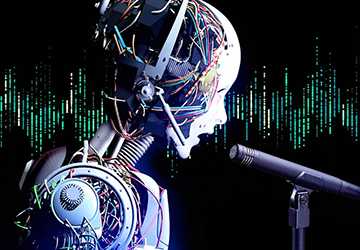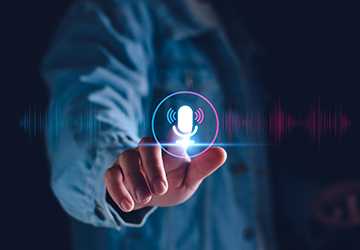The Transformative Impact of Voice Technology on Device Interaction
Voice technology has changed the way we interact with digital devices. From making calls and sending messages to controlling smart homes and accessing knowledge, voice technology is essential to our daily lives. This talk discusses the future of voice technology, the popularity of voice-controlled devices, and the impact of voice assistants on all aspects of our lives.

The Evolution of Language Technology
The Early Beginnings
Voice technology has evolved tremendously since its inception. Initially limited to basic voice recognition systems that could only understand a small subset of commands, advances in artificial intelligence and machine learning have transformed voice technology into a sophisticated tool capable of deciphering and processing complex commands.
Modern Innovations
Modern language technology is powered by advanced algorithms that simplify natural language processing and understanding. This development has accelerated the emergence of voice-controlled devices that can perform various tasks, from playing audio to controlling home appliances.
The Future of Voice Technology
Integration with AI
The future of voice technology is inseparable from the development of artificial intelligence. AI will continue to expand voice technology's capabilities, making it more intuitive and efficient. We expect voice-controlled devices to become increasingly intelligent, recognizing context and providing more perceptive responses.
Advanced Applications
The future of voice technology will be applied in various fields, such as medicine, education, and customer service. In healthcare, voice technology can help healthcare professionals diagnose and treat patients. In education, it can provide students with a tailored learning experience. In customer service, she can provide instant support and respond to inquiries quickly.
Improving User Experience
The future of voice technology is expected to improve the user experience. With the advancement of voice recognition and processing, users can interact with devices more naturally and easily, increasing the adoption of voice-controlled devices in daily life.
Voice-Controlled Devices
Smart Home
Voice-controlled devices turn our homes into intelligent environments. Users can control lighting, adjust thermostat settings, and secure access points with simple voice commands. These devices provide unparalleled convenience and efficiency, simplifying daily tasks and increasing fun.
Personal Assistants
Devices such as Amazon Echo and Google Home have become popular personal assistants. These voice-controlled devices can perform countless functions, from setting reminders and playing music to providing weather forecasts and answering questions.
Automotive Integration
The automotive industry also relies on voice-controlled devices. Modern vehicles are equipped with voice-activated systems that allow drivers to control navigation, make calls, and access entertainment without giving up steering wheel control, thereby improving safety and comfort on the road.
Impact of Voice Assistants
Comfort and Efficiency
Voice assistants have an enormous impact on our daily lives. They offer unparalleled comfort and efficiency, allowing users to perform tasks hands-free. Whether setting a timer while cooking or sending a message while navigating, voice assistants make it easy to multitask.
Accessibility
The impact of voice assistants is significant for people with disabilities. Voice technology allows visually impaired users to interact with their devices and quickly access information, promoting inclusion and allowing people to live more autonomous lives.
Privacy Concerns
Despite the myriad benefits, there are privacy concerns due to the impact of voice assistants. Voice assistants are often set to a wake word, which means they are active and may record conversations. This has sparked debate about the ethical impact of voice technology and the need for solid data protection measures.

Business Applications
The impact of voice assistants extends to the business sector. Companies are using voice technology to improve customer service and streamline operations. Voice assistants can handle customer queries, process orders, and provide product information, improving customer experience.
Challenges and Opportunities
Technical Limitations
Despite significant advances, voice technology still faces technical limitations. Accents, dialects, and background noise can all affect the accuracy of voice recognition. Developers are constantly working to overcome these challenges and improve the performance of voice-controlled devices.
Security Risks
The future of voice technology must consider the security risks associated with voice assistants. Malicious actors may exploit vulnerabilities in voice systems to gain unauthorized access to sensitive information.
Market Growth
The market for voice-controlled devices will grow exponentially over the next few years. As technology advances, more consumers will adopt voice assistants, driving the demand for innovative, easy-to-use devices.
Voice Technology Integrating Into Different Sectors
Advances in Healthcare
The future of voice technology in healthcare offers endless possibilities. Voice assistants integrate seamlessly into medical practices, allowing for hands-free access to patient records, dictation of clinical notes, and even remote patient monitoring through voice-controlled devices.
Innovation in Education
The impact of voice assistants on education is profound. They allow learners to interact with educational materials through voice commands, allowing for a tailored learning experience. This not only helps students with disabilities but also improves the learning environment for all by providing instant information access and interactive learning sessions.
Retail and E-commerce
The future of voice technology in retail is transforming the shopping experience. Consumers now use voice-controlled devices to browse products, place orders, and monitor deliveries.
Hospitality
The hospitality industry is also benefiting from voice assistants' numerous benefits. Hotels are integrating voice technology to provide personalized services to guests, from customizing room amenities to reserving tables.
Social and Cultural Impact
Changing Communication Norms
The future of voice technology is reshaping our communication paradigms. The rise of voice-controlled devices and assistants is changing social norms and making voice-technology interactions ubiquitous.
Improving Inclusion
Voice assistants have a significant impact on promoting inclusion. They provide greater autonomy and convenience to people with disabilities, enabling them to complete tasks that would otherwise be difficult.
Data Protection and Ethical Considerations
As voice technology develops in the future, important privacy and ethical considerations arise. The ubiquity of voice-controlled devices raises concerns about data security and the potential use of personal information.
Conclusion
Voice technology is undoubtedly changing the way we interact with our devices. The future of voice technology holds great potential, promising more intelligent and intuitive voice-controlled devices. Voice assistants have profoundly impacted our daily lives, providing convenience, accessibility, and efficiency. However, challenges must be addressed, and ethical use of this technology must be ensured. Over time, voice technology will continue to shape our world, enabling more seamless and natural interactions with devices.